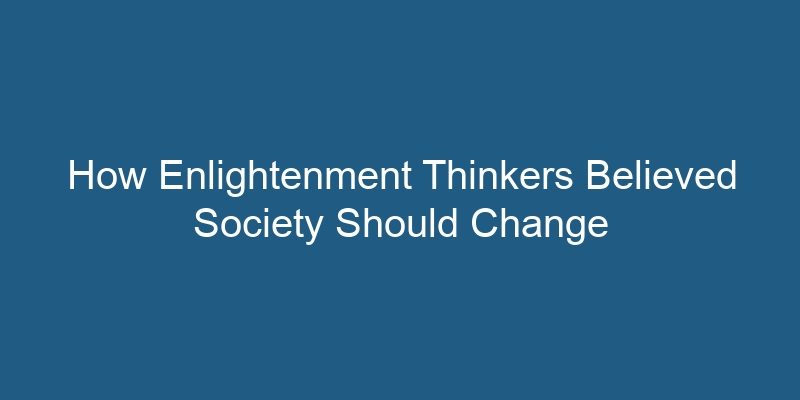- Introduction
- The Power of Reason
- 1. Challenging Traditional Authority
- 2. Embracing Scientific Inquiry
- Social and Political Changes
- 1. Social Contract Theory
- 2. Equality and Individual Rights
- 3. Secularism and Religious Tolerance
- Education and Enlightenment
- 1. Universal Education
- 2. Emphasis on Reason and Science
- Conclusion
Introduction
The Enlightenment was a period of intellectual and philosophical advancements that took place in Europe during the 18th century. Thinkers of the Enlightenment, also known as philosophers or intellectuals, believed in the power of reason, science, and rationality to improve society. They advocated for a range of changes in various aspects of society, including politics, religion, education, and social structures. This article will explore the key ideas and beliefs of Enlightenment thinkers regarding the necessary changes in society.
The Power of Reason
One of the central tenets of Enlightenment thinking was the belief in the power of reason. Thinkers of this era emphasized the importance of using logical thinking and critical analysis to understand and solve problems. They argued that society should be based on reason rather than blind faith or tradition.
1. Challenging Traditional Authority
Enlightenment thinkers, such as Voltaire and Montesquieu, believed in questioning the authority of traditional institutions and promoting individual freedom. They challenged the absolute power of monarchies and advocated for the separation of powers in government.
2. Embracing Scientific Inquiry
Enlightenment thinkers were heavily influenced by the Scientific Revolution and its emphasis on observation, experimentation, and the scientific method. They believed that scientific inquiry should be applied to all aspects of life, including social and political problems.
Social and Political Changes
The Enlightenment era witnessed a growing desire for social and political reforms. Thinkers of this time proposed various changes to existing structures in order to create a more just and equitable society.
1. Social Contract Theory
One of the most significant ideas put forth by Enlightenment thinkers, particularly Jean-Jacques Rousseau, was the concept of the social contract. According to this theory, individuals willingly surrender some of their freedoms to a governing authority in exchange for protection and the common good. This idea laid the foundation for the development of modern democratic systems.
2. Equality and Individual Rights
Enlightenment thinkers, including John Locke, argued that all individuals were born with certain natural rights, such as life, liberty, and property. They believed that these rights should be protected by the government and that all individuals should be treated equally under the law.
3. Secularism and Religious Tolerance
The Enlightenment challenged the dominance of the Catholic Church and advocated for religious tolerance. Thinkers like Voltaire and Thomas Jefferson argued for the separation of church and state, emphasizing the importance of freedom of religion and the right to individual belief.
Education and Enlightenment
Enlightenment thinkers recognized the importance of education in fostering a more enlightened society. They believed that education should be accessible to all individuals and aimed at developing critical thinking skills.
1. Universal Education
Enlightenment philosophers, such as John Locke and Jean-Jacques Rousseau, advocated for universal education. They believed that education should not be limited to the elite but should be available to all members of society, regardless of their social status.
2. Emphasis on Reason and Science
Enlightenment thinkers emphasized the importance of teaching reason, logic, and scientific principles in education. They believed that by promoting critical thinking and scientific inquiry, individuals could become more enlightened and contribute to the advancement of society.
Conclusion
The Enlightenment era brought about significant changes in the way society was viewed and governed. Enlightenment thinkers believed in the power of reason, science, and individual freedom to transform society for the better. Their ideas continue to influence modern thinking and have laid the foundation for many of the democratic principles and values we uphold today.










